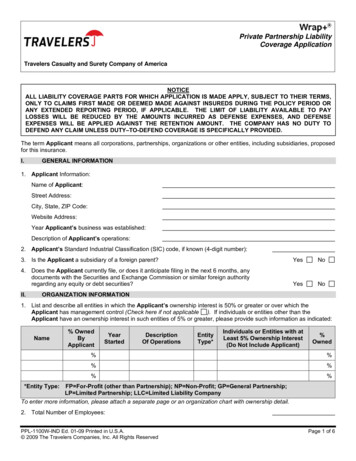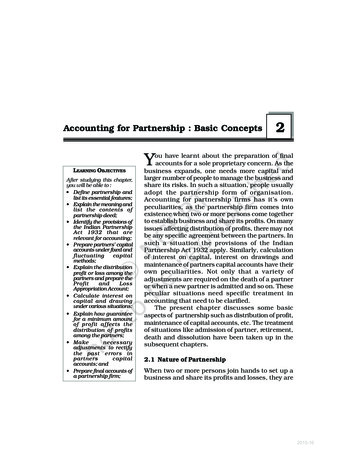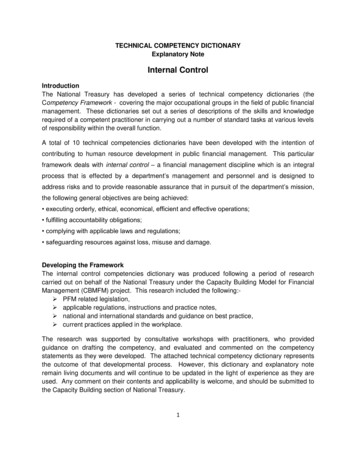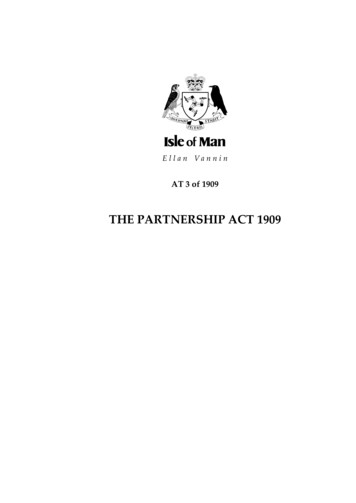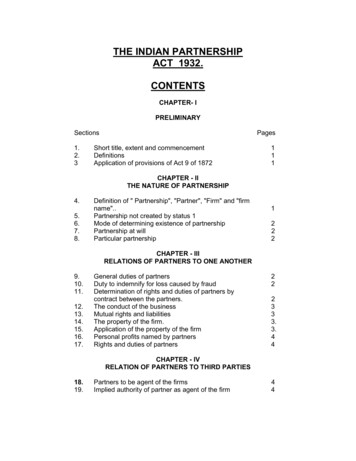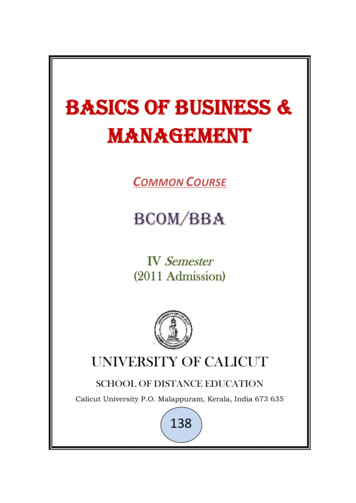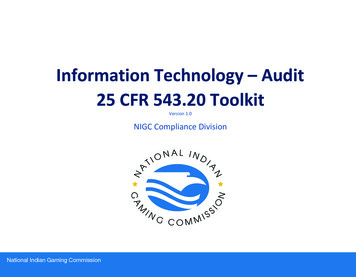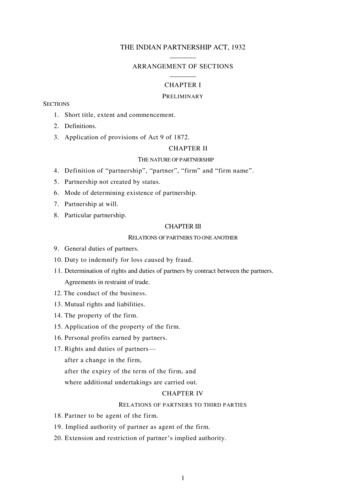
Transcription
THE INDIAN PARTNERSHIP ACT, 1932ARRANGEMENT OF SECTIONSCHAPTER IP RELIMINARYSECTIONS1. Short title, extent and commencement.2. Definitions.3. Application of provisions of Act 9 of 1872.CHAPTER IITHE NATURE OF PARTNERSHIP4. Definition of “partnership”, “partner”, “firm” and “firm name”.5. Partnership not created by status.6. Mode of determining existence of partnership.7. Partnership at will.8. Particular partnership.CHAPTER IIIRELATIONS OF PARTNERS TO ONE ANOTHER9. General duties of partners.10. Duty to indemnify for loss caused by fraud.11. Determination of rights and duties of partners by contract between the partners.Agreements in restraint of trade.12. The conduct of the business.13. Mutual rights and liabilities.14. The property of the firm.15. Application of the property of the firm.16. Personal profits earned by partners.17. Rights and duties of partners—after a change in the firm,after the expiry of the term of the firm, andwhere additional undertakings are carried out.CHAPTER IVR ELATIONS OF PARTNERS TO THIRD PARTIES18. Partner to be agent of the firm.19. Implied authority of partner as agent of the firm.20. Extension and restriction of partner’s implied authority.1
SECTIONS21. Partner’s authority in an emergency.22. Mode of doing act to bind firm.23. Effect of admissions by a partner.,24. Effect of notice to acting partner.25. Liability of a partner for acts of the firm.26. Liability of the firm for wrongful acts of a partner.27. Liability of firm for misapplication by partners.28. Holding out.29. Rights of transferee of a partner ’s interest.30. Minors admitted to the benefits of partnership.CHAPTER VINCOMING AND OUTGOING PARTNERS31. Introduction of a partner.32. Retirement of a partner.33. Expulsion of a partner.34. Insolvency of a partner.35. Liability of estate of deceased partner.36. Rights of outgoing partner to carry on competing business.Agreements in restraint of trade.37. Right of outgoing partner in certain cases to share subsequent profits.38. Revocation of continuing guarantee by change in firm.CHAPTER VIDISSOLUTION OF A FIRM39. Dissolution of a firm.40. Dissolution by agreement.41. Compulsory dissolution.42. Dissolution on the happening of certain contingencies.43. Dissolution by notice of partnership at will.44. Dissolution by the Court.45. Liability for acts of partners done after dissolution.46. Right of partners to have business wound up after dissolution.47. Continuing authority of partners for purposes of winding up.48. Mode of settlement of accounts between partners.49. Payment of firm debts and of separate debts.50. Personal profits earned after dissolution.51. Return of premium on premature dissolution.2
SECTIONS52. Rights where partnership contract is rescinded for fraud or misrepresentation.53. Right to restrain from use of firm name or firm property.54. Agreements in restraint of trade.55. Sale of goodwill after dissolution.Rights of buyer and seller of goodwill.Agreements in restraint of trade.CHAPTER VIIREGISTRATION OF FIRMS56. Power to exempt from application of this Chapter.57. Appointment of Registrars.58. Application for registration.59. Registration.60. Recording of alterations in firm name and principal place of business.61. Noting of closing and opening of branches.62. Noting of changes in names and addresses of partners.63. Recording of changes in and dissolution of a firm.Recording of withdrawal of a minor.64. Rectification of mistakes.65. Amendment of Register by order of Court.66. Inspection of Register and filed documents.67. Grant of copies.68. Rules of evidence.69. Effect of non-registration.70. Penalty for furnishing false particulars.71. Power to make rules.CHAPTER VIIISUPPLEMENTAL72. Mode of giving public notice.73. [Repealed.].74. Savings.SCHEDULE I.—MAXIMUM FEESSCHEDULE II.—[ Repealed.].3
THE INDIAN PARTNERSHIP ACT, 1932A CT N O . 9 OF 1932[8th April, 1932.]An Act to define and amend the law relating to partnership.WHEREAS it is expedient to define and amend the law relating to partnership; it is hereby enacted asfollows:—CHAPTER IPRELIMINARY1. Short title, extent and commencement.—(1) This Act may be called the Indian Partnership Act,1932.1[(2) It extends to the whole of India 2[except the State of Jammu and Kashmir].](3) It shall come into force on the 1st day of October, 1932, except section 69, which shall come intoforce on the 1st day of October, 1933.2. Definitions.—In this Act, unless there is anything repugnant in the subject or context,—(a) an “act of a firm” means any act or omission by all the partners, or by any partner or agent ofthe firm which gives rise to a right enforceable by or against the firm;(b) “business” includes every trade, occupation and profession;(c) “prescribed” means prescribed by rules made under this Act;(d) “third party”, used in relation to a firm or to a partner therein, means any person who is not apartner in the firm; and(e) expressions used but not defined in this Act and defined in the Indian Contract Act, 1872 (9 of1872), shall have the meanings assigned to them in that Act.3. Application of provisions of Act 9 of 1872.—The unrepealed provisions of the Indian ContractAct, 1872 (9 of 1872), save in so far as they are inconsistent with the express provisions of this Act, shallcontinue to apply to firms.CHAPTER IITHE NATURE OF PARTNERSHIP4. Definition of “partnership”, “partner”, “firm” and “firm name”.—“Partnership” is the relationbetween persons who have agreed to share the profits of a business carried on by all or any of them actingfor all.Persons who have entered into partnership with one another are called individually “partners” andcollectively “a firm”, and the name under which their business is carried on is called the “firm name”.5. Partnership not created by status.—The relation of partnership arises from contract and not fromstatus;and, in particular, the members of a Hindu undivided family carrying on a family business as such, ora Burmese Buddhist husband and wife carrying on business as such are not partners in such business1. Subs. by the A. O. 1950, for sub-section (2).2. Subs. by Act 3 of 1951, s. 3 and the Schedule, for “except Part B States”.4
6. Mode of determining existence of partnership.—In determining whether a group of persons is oris not a firm, or whether a person is or is not a partner in a firm, regard shall be had to the real relationbetween the parties, as shown by all relevant facts taken together.Explanation 1.—The sharing of profits or of gross returns arising from property by persons holding ajoint or common interest in that property does not of itself make such persons partners.Explanation 2.—The receipt by a person of a share of the profits of a business, or of a paymentcontingent upon the earning of profits or varying with the profits earned by a business, does not of itselfmake him a partner with the persons carrying on the business;and, in particular, the receipt of such share or payment—(a) by a lender of money to persons engaged or about to engage in any business,(b) by a servant or agent as remuneration,(c) by the widow or child of a deceased partner, as annuity, or(d) by a previous owner or part owner of the business, as consideration for the sale of thegoodwill or share thereof,does not of itself make the receiver a partner with the persons carrying on the business.7. Partnership at will.—Where no provision is made by contract between the partners for theduration of their partnership or for the determination of their partnership, the partnership is “partnership atwill”.8. Particular partnership.—A person may become a partner with another person in particularadventures or undertakings.CHAPTER IIIRELATIONS OF PARTNERS TO ONE ANOTHER9. General duties of partners.—Partners are bound to carry on the business of the firm to thegreatest common advantage, to be just and faithful to each other, and to render true accounts and fullinformation of all things affecting the firm to any partner or his legal representative.10. Duty to indemnify for loss caused by fraud.—Every partner shall indemnify the firm for anyloss caused to it by his fraud in the conduct of the business of the firm.11. Determination of rights and duties of partners by contract between the partners.Agreements in restraint of trade.—(1) Subject to the provisions of this Act, the mutual rights and dutiesof the partners of a firm may be determined by contract between the partners, and such contract may beexpressed or may be implied by a course of dealing.Such contract may be varied by consent of all the partners, and such consent may be expressed ormay be implied by a course of dealing.(2) Notwithstanding anything contained in section 27 of the Indian Contract Act, 1872 (9 of 1872),such contracts may provide that a partner shall not carry on any business other than that of the firm whilehe is a partner.12. The conduct of the business.—Subject to contract between the partners—(a) every partner has a right to take part in the conduct of the business;(b) every partner is bound to attend diligently to his duties in the conduct of the business;(c) any difference arising as to ordinary matters connected with the business may be decided by amajority of the partners, and every partner shall have the right to express his opinion before the matteris decided, but no change may be made in the nature of the business without the consent of all thepartners; and(d) every partner has a right to have access to and to inspect and copy any of the booksof the firm.5
13. Mutual rights, and liabilities.—Subject to contract between the partners—(a) a partner is not entitled to receive remuneration for taking part in the conduct of the business;(b) the partners are entitled to share equally in the profits earned, and shall contribute equally tothe losses sustained by the firm;(c) where a partner is entitled to interest on the capital subscribed by him such interest shall bepayable only out of profits;(d) a partner making, for the purposes of the business, any payment or advance beyond theamount of capital he has agreed to subscribe, is entitled to interest thereon at the rate of six per cent.per annum;(e) the firm shall indemnify a partner in respect of payments made and liabilities incurred byhim—(i) in the ordinary and proper conduct of the business, and(ii) in doing such act, in an emergency, for the purpose of protecting the firm from loss, aswould be done by a person of ordinary prudence, in his own case, under similar circumstances;and(f) a partner shall indemnify the firm for any loss caused to it by his wilful neglect in the conductof the business of the firm.14. The property of the firm.—Subject to contract between the partners, the property of the firmincludes all property and rights and interests in property originally brought into the stock of the firm, oracquired, by purchase or otherwise, by or for the firm, or for the purposes and in the course of thebusiness of the firm, and includes also the goodwill of the business.Unless the contrary intention appears, property and rights and interests in property acquired withmoney belonging to the firm are deemed to have been acquired for the firm.15. Application of the property of the firm.—Subject to contract between the partners, the propertyof the firm shall be held and used by the partners exclusively for the purposes of the business.16. Personal profits earned by partners.—Subject to contract between the partners,—(a) if a partner derives any profits for himself from any transaction of the firm, or from the use ofthe property or business connection of the firm or the firm name, he shall account for that profit andpay it to the firm;(b) if a partner carries on any business of the same nature as and competing with that of the firm,he shall account for and pay to the firm all profits made by him in that business.17. Rights and duties of partners—after a change in the firm, after the expiry of the term of thefirm, and—where additional undertakings are carried out.—Subject to contract between thepartners,—(a) where a change occurs in the constitution of a firm, the mutual rights and duties of thepartners in the reconstituted firm remain the same as they were immediately before the change, as faras may be;(b) where a firm constituted for a fixed term continues to carry on business after the expiry of thatterm, the mutual rights and duties of the partners remain the same as they were before the expiry, sofar as they may be consistent with the incidents of partnership at will; and(c) where a firm constituted to carry out one or more adventures or undertakings carries out otheradventures or undertakings, the mutual rights and duties of the partners in respect of the otheradventures or undertakings are the same as those in respect of the original adventures or undertakings.6
CHAPTER IVRELATIONS OF PARTNERS TO THIRD PARTIES18. Partner to be agent of the firm.— Subject to the provisions of this Act, a partner is the agent ofthe firm for the purposes of the business of the firm.19. Implied authority of partner as agent of the firm.—(1) Subject to the provisions of section 22,the act of a partner which is done to carry on, in the usual way, business of the kind carried on by thefirm, binds the firm.The authority of a partner to bind the firm conferred by this section is called his “implied authority”.(2) In the absence of any usage or custom of trade to the contrary, the implied authority of a partnerdoes not empower him to—(a) submit a dispute relating to the business of the firm to arbitration,(b) open a banking account on behalf of the firm in his own name,(c) compromise or relinquish any claim or portion of a claim by the firm,(d) withdraw a suit or proceeding filed on behalf of the firm,(e) admit any liability in a suit or proceeding against the firm,(f) acquire immovable property on behalf of the firm,(h) transfer immovable property belonging to the firm, or(g) enter into partnership on behalf of the firm.20. Extension and restriction of partner's implied authority.—The partners in a firm may, bycontract between the partners, extend or restrict the implied authority of any partner.Notwithstanding any such restriction, any act done by a partner on behalf of the firm which fallswithin his implied authority binds the firm, unless the person with whom he is dealing knows of therestriction or does not know or believe that partner to be a partner.21. Partner’s authority in an emergency.—A Partner has authority, in an emergency, to do all suchacts for the purpose of protecting the firm from loss as would be done by a person of ordinary prudence,in his own case, acting under similar circumstances, and such acts bind the firm.22. Mode of doing act to bind firm.—In order to bind a firm, an act or instrument done or executedby a partner or other person on behalf of the firm shall be done or executed in the firm name, or in anyother manner expressing or implying an intention to bind the firm.23. Effect of admissions by a partner.—An admission or representation made by a partnerconcerning the affairs of the firm is evidence against the firm, if it is made in the ordinary course ofbusiness.24. Effect of notice to acting partner.—Notice to a partner who habitually acts in the business of thefirm of any matter relating to the affairs of the firm operates as notice to the firm, except in the case of afraud on the firm committed by or with the consent of that partner.25. Liability of a partner for acts of the firm.—Every partner is liable, jointly with all the otherpartners and also severally, for all acts of the firm done while he is a partner.26. Liability of the firm for wrongful acts of a partner.—Where, by the wrongful act or omissionof a partner acting in the ordinary course of the business of a firm, or with the authority of his partners,loss or injury is caused to any third party, or any penalty is incurred, the firm is liable therefor to the sameextent as the partner.27. Liability of firm for misapplication by partners.—Where—(a) a partner acting within his apparent authority receives money or property from a third partyand misapplies it, or7
(b) a firm in the course of its business receives money or property from a third party, and themoney or property is misapplied by any of the partners while it is in the custody of the firm,the firm is liable to make good the loss.28. Holding out.—(1) Any one who by words spoken or written or by conduct represents himself, orknowingly permits himself to be represented, to be a partner in a firm, is liable as a partner in that firm toany one who has on the faith of any such representation given credit to the firm, whether the personrepresenting himself or represented to be a partner does or does not know that the representation hasreached the person so giving credit.(2) Where after a partner’s death the business is continued in the old firm name, the continued use ofthat name or of the deceased partner’s name as a part thereof shall not itself make his legal representativeor his estate liable for any act of the firm done after his death.29. Rights of transferee of a partner’s interest.—(1) A transfer by a partner of his interest in thefirm, either absolute or by mortgage, or by the creation by him of a charge on such interest, does notentitle the transferee, during the continuance of the firm, to interfere in the conduct of the business, or torequire accounts, or to inspect the books of the firm, but entitles the transferee only to receive the share ofprofits of the transferring partner, and the transferee shall accept the account of profits agreed to by thepartners.(2) If the firm is dissolved or if the transferring partner ceases to be a partner, the transferee is entitledas against the remaining partners to receive the share of the assets of the firm to which the transferringpartner is entitled, and, for the purpose of ascertaining that share, to an account as from the date of thedissolution.30. Minors admitted to the benefits of partnership.—(1) A person who is a minor according to thelaw to which he is subject may not be a partner in a firm, but, with the consent of all the partners for thetime being, he may be admitted to the benefits of partnership.(2) Such minor has a right to such share of the property and of the profits of the firm as may beagreed upon, and he may have access to and inspect and copy any of the accounts of the firm.(3) Such minor’s share is liable for the acts of the firm, but the minor is not personally liable for anysuch act.(4) Such minor may not sue the partners for an account or payment of his share of the property orprofits of the firm, save when severing his connection with the firm, and in such case the amount of hisshare shall be determined by a valuation made as far as possible in accordance with the rules contained insection 48:Provided that all the partners acting together or any partner entitled to dissolve the firm upon notice toother partners may elect in such suit to dissolve the firm, and thereupon the Court shall proceed with thesuit as one for dissolution and for settling accounts between the partners, and the amount of the share ofthe minor shall be determined along with the shares of the partners.(5) At any time within six months of his attaining majority, or of his obtaining knowledge that he hadbeen admitted to the benefits of partnership, whichever date is later, such person may give public noticethat he has elected to become or that he has elected not to become a partner in the firm, and such noticeshall determine his position as regards the firm:Provided that, if he fails to give such notice, he shall become a partner in the firm on the expiry of thesaid six months.(6) Where any person has been admitted as a minor to the benefits of partnership in a firm, the burdenof proving the fact that such person had no knowledge of such admission until a particular date after theexpiry of six months of his attaining majority shall lie on the persons asserting that fact.8
(7) Where such person becomes a partner,—(a) his rights and liabilities as a minor continue up to the date on which he becomes a partner, buthe also becomes personally liable to third parties for all acts of the firm done since he was admitted tothe benefits of partnership, and(b) his share in the property and profits of the firm shall be the share to which he was entitled as aminor.(8) Where such person elects not to become a partner,—(a) his rights and liabilities shall continue to be those of a minor under this section up to the dateon which he gives public notice,(b) his share shall not be liable for any acts of the firm done after the date of the not ice,and(c) he shall be entitled to sue the partners for his share of the property and profits in accordancewith sub-section (4).(9) Nothing in sub-sections (7) and (8) shall affect the provisions of section 28.CHAPTER VINCOMING AND OUTGOING PARTNERS31. Introduction of a partner.—(1) Subject to contract between the partners and to the provisions ofsection 30, no person shall be introduced as a partner into a firm without the consent of all the existingpartners.(2) Subject to the provisions of section 30, a person who is introduced as a partner into a firm doesnot thereby become liable for any act of the firm done before he became a partner.32. Retirement of a partner.—(1) A partner may retire—(a) with the consent of all the other partners,(b) in accordance with an express agreement by the partners, or(c) where the partnership is at will, by giving notice in writing to all the other partners of hisintention to retire.(2) A retiring partner may be discharged from any liability to any third party for acts of the firm donebefore his retirement by an agreement made by him with such third party and the partners of thereconstituted firm, and such agreement may be implied by a course of dealing between such third partyand the reconstituted firm after he had knowledge of the retirement.(3) Notwithstanding the retirement of a partner from a firm, he and the partners continue tobe liable as partners to third parties for any act done by any of them which would have been anact of the firm if done before the retirement, until public notice is given of the retirement:Provided that a retired partner is not liable to any third party who deals with the firm without knowingthat he was a partner.(4) Notices under sub-section (3) may be given by the retired partner or by any partner of thereconstituted firm.33. Expulsion of a partner.—(1) A partner may not be expelled from a firm by any majority of thepartners, save in the exercise in good faith of powers conferred by contract between the partners.(2) The provisions of sub-sections (2), (3) and (4) of section 32 shall apply to an expelled partner asif he were a retired partner.34. Insolvency of a partner.—(1) Where a partner in a firm is adjudicated an insolvent he ceasesto be a partner on the date on which the order of adjudication is made, whether or not the firm isthereby dissolved.9
(2) Where under a contract between the partners the firm is not dissolved by the adjudication of apartner as an insolvent, the estate of a partner so adjudicated is not liable for any act of the firm and thefirm is not liable for any act of the insolvent, done after the date on which the order of adjudication ismade.35. Liability of estate of deceased partner. — Where under a contract between the partners the firmis not dissolved by the death of a partner, the estate of a deceased partner is not liable for any act of thefirm done after his death.36. Rights of outgoing partner to carry on competing business. Agreements in restraint oftrade.—(1) An outgoing partner may carry on a business competing with that of the firm and he mayadvertise such business, but, subject to contract to the contrary, he may not—(a) use the firm name,(b) represent himself as carrying on the business of the firm, or(c) solicit the custom of persons who were dealing with the firm before he ceased to be a partner.(2) A partner may make an agreement with his partners that on ceasing to be a partner he will notcarry on any business similar to that of the firm within a specified period or within specified local limits;and, notwithstanding anything contained in section 27 of the Indian Contract Act, 1872 (9 of 1872), suchagreement shall be valid if the restrictions imposed are reasonable.37. Right of outgoing partner in certain cases to share subsequent profits.—Where any memberof a firm has died or otherwise ceased to be a partner, and the surviving or continuing partners carry onthe business of the firm with the property of the firm without any final settlement of accounts as betweenthem and the outgoing partner or his estate, then, in the absence of a contract to the contrary, the outgoingpartner or his estate is entitled at the option of himself or his representatives to such share of the profitsmade since he ceased to be a partner as may be attributable to the use of his share of the property of thefirm or to interest at the rate of six per cent. per annum on the amount of his share in the property of thefirm:Provided that where by contract between the partners an option is given to surviving or continuingpartners to purchase the interest of a deceased or outgoing partner, and that option is duly exercised, theestate of the deceased partner, or the outgoing partner or his estate, as the case may be, is not entitled toany further or other share of profits; but if any partner assuming to act in exercise of the option does notin all material respects comply with the terms thereof, he is liable to account under the foregoingprovisions of this section.CHAPTER VIDISSOLUTION OF A FIRM39. Dissolution of a firm.—The dissolution of partnership between all the partners of a firm is calledthe “dissolution of the firm”.40. Dissolution by agreement.—A firm may be dissolved with the consent of all the partners or inaccordance with a contract between the partners.41. Compulsory dissolution.—A firm is dissolved—(a) by the adjudication of all the partners or of all the partners but one as insolvent, or(b) by the happening of any event which makes it unlawful for the business of the firm to becarried on or for the partners to carry it on in partnership :10
Provided that, where more than one separate adventure or undertaking is carried on by the firm, theillegality of one or more shall not of itself cause the dissolution of the firm in respect of its lawfuladventures and undertakings.42. Dissolution on the happening of certain contingencies.—Subject to contract between thepartners a firm is dissolved—(a) if constituted for a fixed term, by the expiry of that term;(b) if constituted to carry out one or more adventures or undertakings, by the completion thereof;(c) by the death of a partner; and(d) by the adjudication of a partner as an insolvent.43. Dissolution by notice of partnership at will.—(1) Where the partnership is at will, the firm maybe dissolved by any partner giving notice in writing to all the other partners of his intention to dissolve thefirm.(2) The firm is dissolved as from the date mentioned in the notice as the date of dissolution or, if nodate is so mentioned, as from the date of the communication of the notice.44. Dissolution by the Court.—At the suit of a partner, the Court may dissolve a firm on any of thefollowing grounds, namely:—(a) that a partner has become of unsound mind, in which case the suit may be brought as well bythe next friend of the partner who has become of unsound mind as by any other partner;(b) that a partner, other than the partner suing, has become in any way permanently incapable ofperforming his duties as partner;(c) that a partner, other than the partner suing, is guilty of conduct which is likely to affectprejudicially the carrying on of the business, regard being had to the nature of the business;(d) that a partner, other than the partner suing, wilfully or persistently commits breach ofagreements relating to the management of the affairs of the firm or the conduct of its business, orotherwise so conducts himself in matters relating to the business that it is not reasonably practicablefor the other partners to carry on the business in partnership with hint;(e) that a partner, other than the partner suing, has in any way transferred the whole of his interestin the firm to a third party, or has allowed his share to be charged under the provisions of rule 49 ofOrder XXI of the First Schedule to the Code of Civil Procedure, 1908 (5 of 1908), or has allowed it tobe sold in the recovery of arrears of land-revenue or of any dues recoverable as arrears of landrevenue due by the partner;(f) that the business of the firm cannot be carried on save at a loss; or(g) on any ground which renders it just and equitable that the firm should be dissolved.45. Liability for acts of partners done after dissolution.—(1) Notwithstanding the dissolution of afirm, the partners continue to be liable as such to third parties for any act done by any of them whichwould have been an act of the firm if done before the dissolution, until public notice is given of thedissolution:Provided that the estate of a partner who dies, or who is adjudicated an insolvent, or of a partner who,not having been known to the person dealing with the firm to be a partner, retires from the firm, is notliable under this section for acts done after the date on which he ceases to be a partner.(2) Notices under sub-section (1) may be given by any partner.46. Right of partners to have business wound up after dissolution.—On the dissolution of afirm every partner or his representative is entitled, as against all the other partners or theirrepresentatives, to have the property of the firm applied in payment of the debts and liabilities of the11
firm, and to have the surplus distributed among the partners o
4 THE INDIAN PARTNERSHIP ACT, 1932 ACT NO. 9 OF 1932 [8th April, 1932.] An Act to define and amend the law relating to partnership. WHEREAS it is expedient to define and amend the law relating to partnership; it is hereby enacted as follows:— CHAPTER I PRELIMINARY 1. Short title, extent and commencement.—(1) This Act may be called the Indian Partnership Act,


